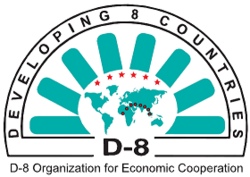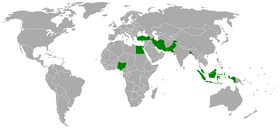Organization:D-8 Organization for Economic Cooperation
 | |
 Members of D-8[1] | |
| Formation | 1996 1997 (1 Summit) |
|---|---|
| Legal status | Intergovernmental organization |
| Headquarters | Istanbul, Turkey |
Membership | 9
|
Secretary-General | Sohail Mahmood |
President | Badr Abdul Ati[2] |
Chairman | Prabowo Subianto |
| Website | www |
The D-8 Organization for Economic Cooperation, also known as Developing-8, is an organisation for development co-operation among Bangladesh, Egypt, Indonesia, Iran, Malaysia, Nigeria, Pakistan, and Turkey.[3] Azerbaijan was admitted to the organization as the 9th member on 19 December 2024.[4]
The combined population of the eight countries is about 1.2 billion or 60% of all Muslims, or close to 13% of the world's population and covering an area of 7.6 million square kilometers, 5% of world land area.[5] In 2006, trade between the D-8 member states stood at $35 billion, and it was around $68 billion in 2010.[6] Transactions between the eight developing countries accounted for 3.3 percent of world trade in 2010.[6] The total nominal GDP of the eight nations was around 4.92 trillion as of 2023.
Purposes and objectives
The main areas of co-operation include finance, banking, rural development, science and technology, humanitarian development, agriculture, energy, environment, and health.[5]
In the first Summit Declaration (Istanbul, 1997), the main objective of D-8 is stated to be socio-economic development in accordance with the following principles:
- Peace instead of conflict.
- Dialogue instead of confrontation.
- Cooperation instead of exploitation.
- Justice instead of double standard.
- Equality instead of discrimination.
- Democracy instead of oppression.
The fifth D-8 Summit Declaration (Bali, 2006) produced the following, as illustration of the application of the group's objectives:
- Commitment to work together to solve the problem of economic disparities within our countries.
- Reaffirm commitment to enhance co-operation in the field of energy to develop alternative and renewable energy resources.
- Emphasize the importance of D-8 in contributing to the economic development of its member countries and ensure that it promotes global trade.[7]
Structure
The Summit, which is convened every two years, has the highest level of authority, and is composed of the leaders of each member state.[8]
The Council is the principal decision-making body and forum for consideration of issues relating to the and is composed of the foreign affairs ministers of each member state.
The Commission has executive authority, and is composed of Commissioners appointed by each member state's government. Commissioners are responsible for promoting compliance with directives in their respective nation. Finally, an executive director is appointed by D-8 members to facilitate communication and to act in a supervisory capacity during each summit or lower-level assembly.
D-8 Summits
| Date | Host country | Host leader | Location held | |
|---|---|---|---|---|
| 1 | June 1997 | Necmettin Erbakan | Istanbul | |
| 2 | March 1999 | Sheikh Hasina | Dhaka | |
| 3 | February 2001 | Hosni Mubarak | Cairo | |
| 4 | February 2004 | Mohammad Khatami | Tehran | |
| 5 | May 2006 | Susilo Bambang Yudhoyono | Bali | |
| 6 | July 2008 | Abdullah Ahmad Badawi | Kuala Lumpur | |
| 7 | July 2010 | Muhammadu Buhari | Abuja | |
| 8 | November 2012 | Asif Ali Zardari | Islamabad | |
| 9 | October 2017 | Recep Tayyip Erdoğan | Istanbul | |
| 10 | April 2021 | Sheikh Hasina | Virtual | |
| 11 | 18-20 December 2024 | Abdel Fattah el-Sisi | Cairo | |
| 12 | 2026-2027 |
Member countries
| Country | Population (2024) | Nominal GDP (USD million) 2024[9] | Nominal GDP per capita ($) 2024[9] | PPP GDP (USD million) 2024[9] | PPP GDP per capita ($) 2024[9] | Life expectancy (years, avg. 2021) | HDI (2021)[10] |
|---|---|---|---|---|---|---|---|
| 10,353,296 | 78,749 | 7,641 | 199,195 | 19,328 | 72.9 | 0.760 (high) | |
| 173,562,364 | 451,468 | 2,625 | 1,690,000 | 9,840 | 74.3 | 0.661 (medium) | |
| 116,538,258 | 380,044 | 3,542 | 2,230,000 | 20,799 | 71.8 | 0.731 (high) | |
| 283,487,931 | 1,402,590 | 4,981 | 4,661,542 | 16,542 | 71.3 | 0.705 (high) | |
| 91,567,738 | 434,243 | 5,013 | 1,700,000 | 19,607 | 77.3 | 0.774 (high) | |
| 35,557,673 | 439,748 | 13,142 | 1,370,942 | 41,022 | 74.7 | 0.803 (very high) | |
| 232,679,478 | 372,970 | 1,637 | 1,490,000 | 6,543 | 62.6 | 0.535 (low) | |
| 251,269,164 | 374,595 | 1,588 | 1,580,000 | 6,715 | 68 | 0.544 (medium) | |
| 87,473,805 | 1,344,318 | 15,666 | 3,460,000 | 40,283 | 78.6 | 0.838 (very high) | |
| Average | 142,498,856 | 586,525 | 6,204 | 2,042,409 | 20,075 | 72.0 | 0.705 (high) |
| Combined | 1,282,489,707 | 5,278,725 | N/A | 18,381,679 | N/A | N/A | N/A |
Secretaries-General
The Secretary General of the D-8 Organization for Economic Cooperation serves as the chief executive of the Secretariat. The Secretary General is appointed by the Summit, upon the recommendation of the Council of Ministers, by consensus from among qualified candidates nominated by Member States, for a single non-renewable term of four years, in accordance with Article 9.3 of the D-8 Charter and the principle of rotation among Member Countries.[11]
| No. | Name | Country of origin | Took office | Left office |
|---|---|---|---|---|
| 1 | Ayhan Kamel | 1997 | 2006 | |
| 2 | Dipo Alam | 2006 | 2010 | |
| 3 | Widi Agoes Pratikto | 2010 | 2012 | |
| 4 | Seyed Ali Mohammad Mousavi[12] | 2013 | 2017 | |
| 5 | Ku Jaafar Ku Shaari[13] | 2018 | 2021 | |
| 6 | Isiaka Abdulqadir Imam[14] | 2022 | 2025 | |
| 7 | Sohail Mahmood | 2026 | present |
Affiliated Bodies
- D-8 International University[15]
- D-8 Map of Scientific Excellence and Collaboration (D8-MSEC)[16]
- D-8 Network of Pioneers for Research and Innovation (D-8 NPRI)[17]
- D-8 Technology Transfer and Exchange Network (D-8 TTEN)[18]
- D-8 Health and Social Protection Programme (D-8 HSP)[19]
- D-8 Research Center for Agriculture and Food Security[20]
See also
- Newly industrialized country
- Next Eleven
References
- ↑ The official website adopts the "G-15" orthography (with a hyphen) in order to distinguish an abbreviated references to this group – contrasts with other similarly named entities.
- ↑ "مصر ریاست گروه دی هشت را برعهده گرفت". 18 December 2024. https://www.isna.ir/news/1403092820873/%D9%85%D8%B5%D8%B1-%D8%B1%DB%8C%D8%A7%D8%B3%D8%AA-%DA%AF%D8%B1%D9%88%D9%87-%D8%AF%DB%8C-%D9%87%D8%B4%D8%AA-%D8%B1%D8%A7-%D8%A8%D8%B1%D8%B9%D9%87%D8%AF%D9%87-%DA%AF%D8%B1%D9%81%D8%AA?utm_source=chatgpt.com.
- ↑ "Brief History of D-8". http://www.developing8.org/About.aspx/.
- ↑ Azerbaijan Joins D-8 as New Member at Cairo Summit
- ↑ 5.0 5.1 "D8 ministerial summit opens today". Tehran Times. 27 February 2010. http://www.tehrantimes.com/index_View.asp?code=215026.
- ↑ 6.0 6.1 "Iran pledges €50m to D8 fund". tehran times. 28 February 2010. http://www.tehrantimes.com/index_View.asp?code=215102.
- ↑ "Archived copy". http://www.developing8.org/MissionStatement.aspx.
- ↑ "Developing 8". Developing 8. 13 May 2006. http://www.developing8.org/about-d-8/organisational-structure/.
- ↑ 9.0 9.1 9.2 9.3 International Monetary Fund. "World Economic Outlook Database, April 2023". International Monetary Fund. https://www.imf.org/en/Publications/WEO/weo-database/2023/April.
- ↑ Human Development Report 2021-22: Uncertain Times, Unsettled Lives: Shaping our Future in a Transforming World. United Nations Development Programme. 8 September 2022. pp. 272–276. ISBN 978-9-211-26451-7. https://hdr.undp.org/system/files/documents/global-report-document/hdr2021-22pdf_1.pdf. Retrieved 8 September 2022.
- ↑ "Nigerian becomes D-8's Secretary-General - News Digest" (in en-US). News Digest. 2022-01-05. https://newsdigest.ng/nigerian-secretary-general/.
- ↑ "SBY encourages D-8 to boost cooperation - World" (in en). https://www.thejakartapost.com/news/2013/05/22/sby-encourages-d-8-boost-cooperation.html.
- ↑ BAHARIN, MUHD IZAWAN (2017-10-20). "Malaysia to lead D-8 Secretariat beginning Jan 2018: DPM | New Straits Times" (in en). https://www.nst.com.my/news/nation/2017/10/293026/malaysia-lead-d-8-secretariat-beginning-jan-2018-dpm.
- ↑ Somigli, Lorenzo (2023-08-04). "New Kids in The Block: BRICS, MINT, and Now D-8" (in en-US). https://moderndiplomacy.eu/2023/08/04/new-kids-in-the-block-brics-mint-and-now-d-8/.
- ↑ "D-8 International University - D8 International Portal - D8 Portal" (in en-US). http://iu.d8.int/.
- ↑ "Error: no
|title=specified when using {{Cite web}}". https://d8.isc.ac/. - ↑ "Error: no
|title=specified when using {{Cite web}}". http://developing8.org/d-8-npri/. - ↑ "HOME" (in en-US). https://d8tten.org/.
- ↑ "Error: no
|title=specified when using {{Cite web}}". https://developing8.org/areas-of-cooperation/health/. - ↑ "University of Agriculture Faisalabad (UAF)". https://web.uaf.edu.pk/News/NewsDetail/1707.
External links
- D-8 Member States Statistics
- D-8 Publications
- Preferential Trade Agreement
- Agriculture and Food Security
Template:D-8 Organization for Economic Cooperation
 |
